As life-saving burn pits bill finally goes into law, the veteran whose name it bears can finally rest in peace
EXCLUSIVE: For more than a decade, the veteran community has fought for the US government to take the issue of burn pits seriously. Veterans, advocates and those who have lost loved ones along the way speak to Rachel Sharp about the bittersweet victory as President Biden signs the PACT Act into law

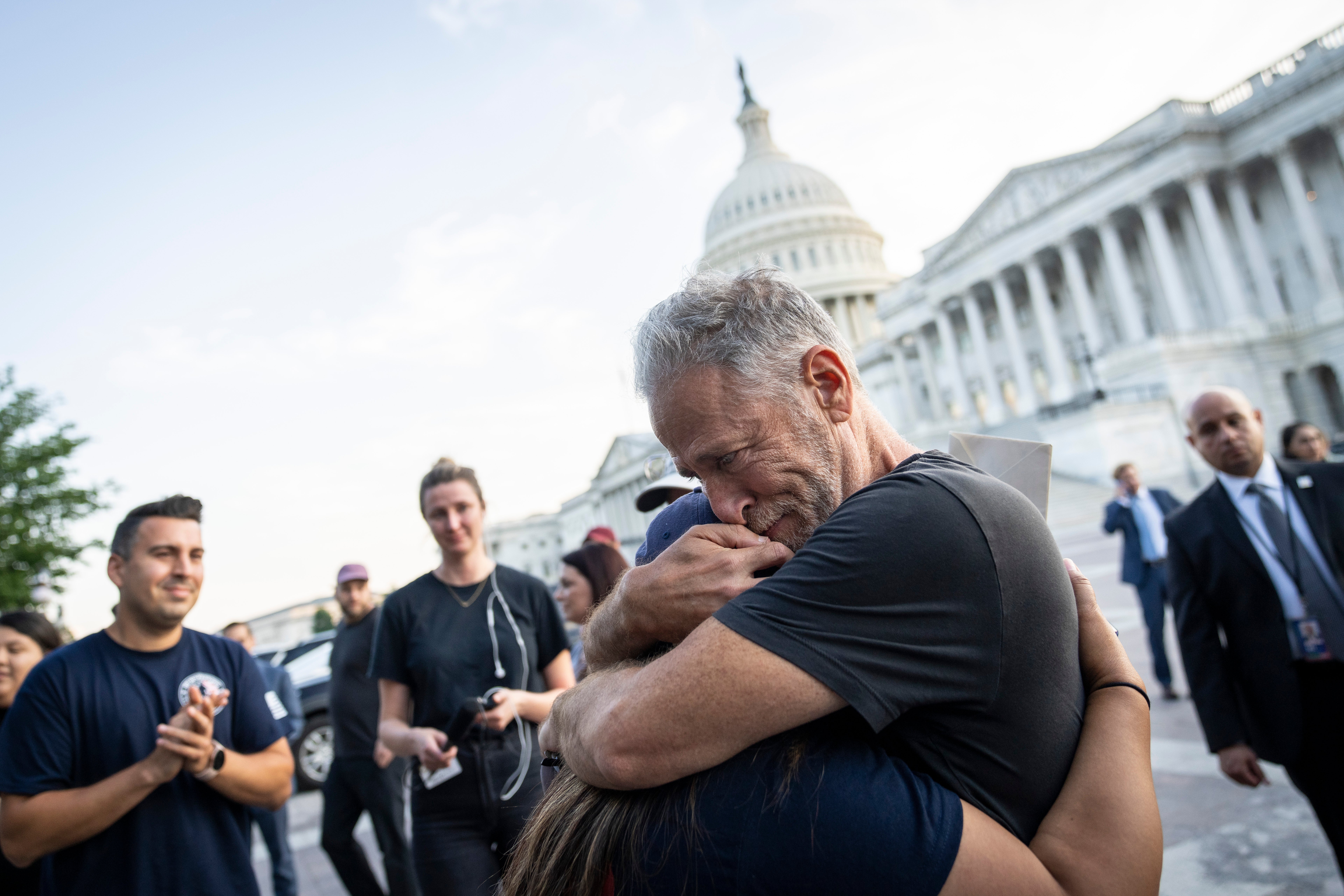
Your support helps us to tell the story
From reproductive rights to climate change to Big Tech, The Independent is on the ground when the story is developing. Whether it's investigating the financials of Elon Musk's pro-Trump PAC or producing our latest documentary, 'The A Word', which shines a light on the American women fighting for reproductive rights, we know how important it is to parse out the facts from the messaging.
At such a critical moment in US history, we need reporters on the ground. Your donation allows us to keep sending journalists to speak to both sides of the story.
The Independent is trusted by Americans across the entire political spectrum. And unlike many other quality news outlets, we choose not to lock Americans out of our reporting and analysis with paywalls. We believe quality journalism should be available to everyone, paid for by those who can afford it.
Your support makes all the difference.It’s been two years since Sgt First Class Heath Robinson died from a rare form of lung cancer caused by toxic exposure to burn pits while serving in Iraq.
On Wednesday, his nine-year-old daughter Brielle, widow Danielle Robinson and mother-in-law Susan Zeier joined President Joe Biden at the White House as the bill named in his honour was finally signed into law.
“I never thought this day would actually come where we would honour my husband’s dying wish to take care of his brothers and sisters in arms,” Danielle told The Independent on Tuesday ahead of the signing.
“A few weeks before he passed, when he was deteriorating rapidly, he said: ‘I can’t be a voice in my own battle so I want you and my mother-in-law to speak for me.’
“I know he’s looking down on us and is very proud to see that we didn’t give up even though we kept being turned down on Capitol Hill. I know Heath would be proud of the journey and the battle and all the hard work and sleepless nights that we’ve been able to get the legislation passed.”
Now, through the SFC Heath Robinson Honoring our PACT Act, an estimated 3.5 million US veterans and service members will finally be able to access the healthcare and disability benefits that they need and deserve after serving their country.
The bipartisan law presumptively links 23 cancers, respiratory illnesses and other conditions to a veterans’ exposure to burn pits while on deployment overseas.
It expands and extends healthcare eligibility for veterans of the Vietnam War, Gulf War, and post-9/11 wars as well as expanding eligibility for veterans impacted by Agent Orange. Every veteran enrolled in VA healthcare will now also be given access to toxic exposure screening.
It is believed to be the largest healthcare and benefit expansion in the history of the Veteran Affairs (VA) – and marks a major turnaround for sick and dying veterans in need of healthcare and benefits because of their service.
It also marks the bittersweet conclusion of a years-long battle by veterans, their families and advocates to convince the legislature to take the issue of burn pits seriously.
The war that followed them home
During America’s post-9/11 wars, mountains of trash from US military bases were dumped into huge, open-air pits and set alight with jet fuel.
Some of the pits spanned several acres and burned 24/7, 365 days a year, steps from where US troops slept, ate and worked.
Thousands returned home sick and dying from rare cancers, respiratory conditions and other illnesses caused by this toxic exposure. Heath was one of them.
As a first class sergeant in the Ohio National Guard, he was deployed to Iraq in 2006 and 2007.
In 2016, he started having nosebleeds. The following year he was diagnosed with a rare autoimmune disease and rare lung cancer which doctors told him was caused by exposure to toxic substances.
He was just 39 when he died in April 2020.
Danielle said Heath continued to fight until the very end for his daughter Brielle.
“Unfortunately she had to grow up so quick so early on. She was a daddy’s girl and she was the reason why Heath was still trying to fight the battle and why he kept going as long as he could,” she said.
This summer, the nine-year-old joined her mother and grandmother in DC to lobby lawmakers to pass her father’s bill.
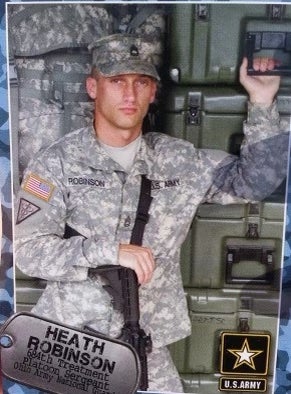
She walked the halls of the Capitol, wrote handwritten notes in crayon and gave them to senators asking them to pass the bill and even spoke at a press conference.
“Heath would be looking down on her tearing up seeing her speaking about her daddy,” Danielle said.
Brielle’s grandmother Ms Zeier said the bill becoming law is “bittersweet” for her granddaughter as it came too late to help her father.
“Sometimes she’ll ask me why didn’t the bill get passed sooner so it could save her daddy’s life,” Ms Zeier told The Independent on Tuesday.
“She knows her daddy’s a hero.”
Prior to the PACT Act’s passage, the VA was turning down almost 80 per cent of all disability claims mentioning burn pits because the burden of proof was shouldered onto veterans to prove a direct link between their exposure and their illness.
Due to the type of cancer Heath suffered from, Ms Zeier said she isn’t sure if access to other healthcare could have saved his life.
But she is certain it could have helped him to die with dignity.
“Heath did not die with dignity because of the denials we had from the VA,” she said.
“A big one was that he was denied medication that would mitigate the excruciating pain he was in toward the end because it cost $2,000 a month. He was in so much pain he begged us to overdose him… if the VA had granted his medication he wouldn’t have had to go through that and we wouldn’t have gone through that trauma.”
While it’s too late for Heath, Ms Zeier that it is “overwhelming and surreal” to finally see the PACT Act being signed into law.
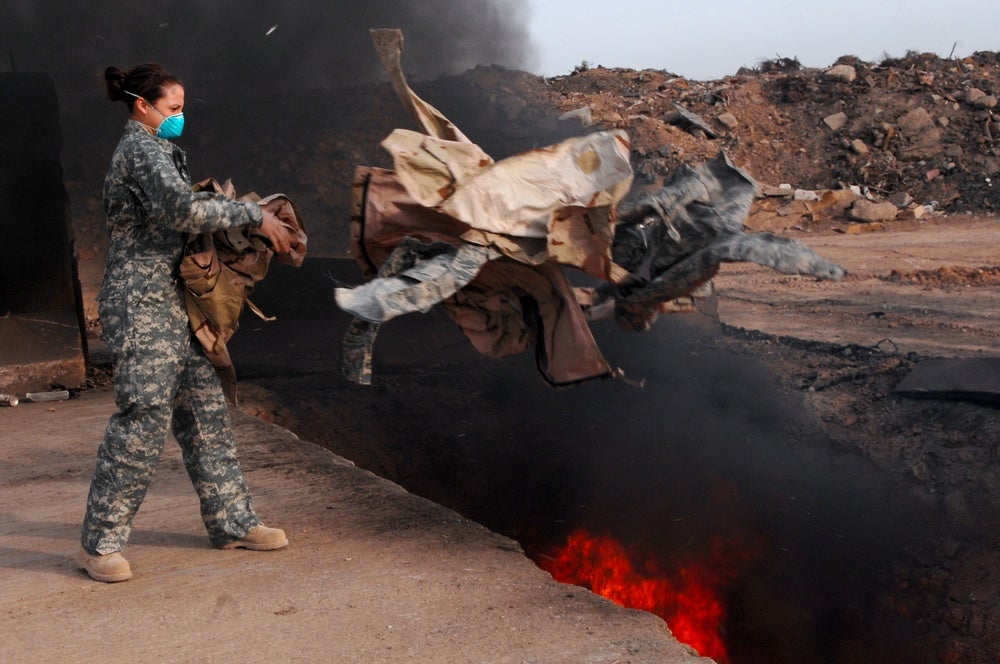
“It’s hard to believe it’s actually happening but I’m thankful and grateful we were able to fulfill Heath’s dying wish and help thousands if not millions of others,” she said.
“It means everything for his legacy… But from the start, this wasn’t about us. It was about fulfilling Heath’s dying wish. So to have his name on the bill, he represents every single veteran who has passed away from burn pits illnesses or has been stricken with burn pits illnesses or will be in the future and their families.
“There’s so many veterans this bill could be named after – we’re honoured that Heath was named.”
It was when Heath received his cancer diagnosis in 2017 that his family joined the fight for the US government to take burn pits seriously.
But, for some, the fight has been going on far longer.
A long fight
It was 13 years ago when Le Roy and Rosie Torres started knocking on doors in Congress trying to wake lawmakers up to the issue.
Le Roy had transitioned from active duty to an Army reserve and was working as a Texas state trooper for the Texas Department of Public Safety (TDPS) when he was deployed to Iraq in 2007.
During his deployment, he began suffering respiratory issues.
Within weeks of his return home, he was hospitalised but doctors were at a loss as to what was wrong with him.
Rosie turned online to look for answers and came across a whole online community of veterans, widows, widowers or families of those who had returned from war and were sick or dying from burn pits exposure.
Finally, Le Roy was diagnosed with constrictive bronchiolitis.
As the condition was not a presumptive condition for service-connected illness at the time, the VA denied Le Roy’s claims.
After serving his country for 23 years, Le Roy and his family were left with no VA healthcare or disability benefits.

The couple launched Burn Pits 360 and have spent more than a decade lobbying the US government for change.
It’s been a long and challenging fight.
Rosie recalled some of those early trips to DC where she was met with a lot of closed doors.
She recounted one memorable early trip where someone finally listened to their story.
She told The Independent that, while Le Roy was at a VA war-related injury centre, she went to meet someone from the American Lung Association.
“She took me into the US Capitol… it was a moment where I had no idea what I was doing. Someone just felt in their heart to say your story is compelling, I’ll take you under my wing and take you into the Capitol to meet some people,” she said on Tuesday.
“I remember being like ‘what is happening? Will this make a difference?’... at the time we had no organisation, it was just me with a flier from a powerpoint. I remember thinking ‘wow I don’t know what I’m doing but know that I’m not going to stop knocking on doors’. And as time went by I started to organise for other veterans’ families to meet me here in town.”
She added: “So we were sort of on our own when I think back to those days.”
Rosie said that the biggest turning point then came when John Feal and Jon Stewart came on board.
It was Mr Feal, a 9/11 survivor, and Mr Stewart, comedian and TV host, who had previously together lobbied the US government to pass the law that now gives first responders healthcare and compensation for illnesses and injuries sustained at Ground Zero.
The duo lobbied Congress to pass the bill in 2010 and reauthorise it in 2015.
In 2019, they then pushed Congress to reauthorise it for good. Now, 9/11 survivors will be given access to the funds and healthcare that they need up until 2090.
Rosie reached out to Mr Feal who then reached out to Mr Stewart and they together joined in the fight and helped to make burn pits a topic that everyday Americans have now heard of and lawmakers could no longer ignore.
Before then, Rosie said lawmakers only “knew of me”.
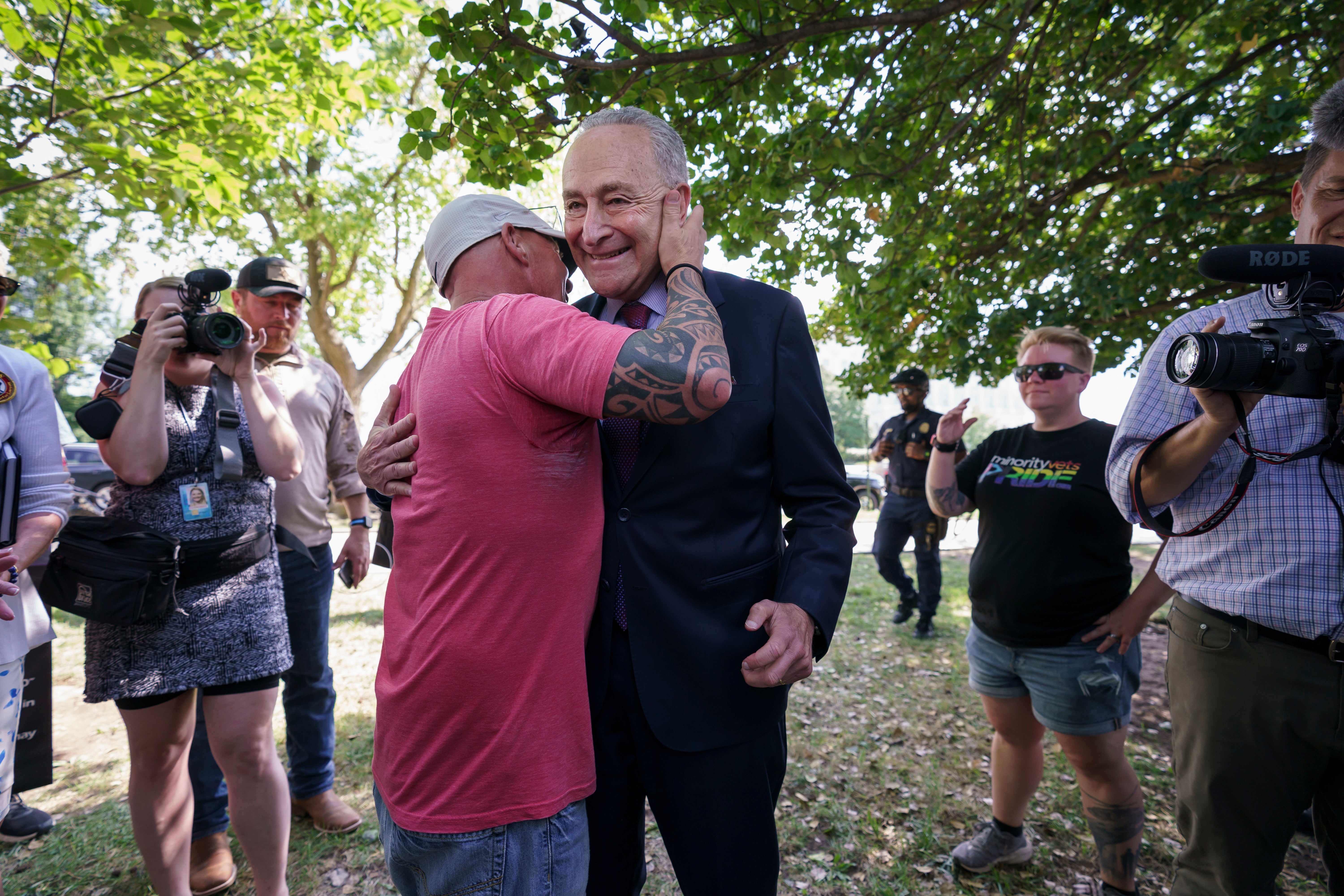
“They knew who I was. They knew of me and heard of the briefings we were hosting and the fliers we were putting out and our social media but it wasn’t until Jon [Stewart] joined us,” she said.
Getting a famous name on board got some people in DC rattled, she recalled.
“I was called a liar about having Jon Stewart on board,” she said.
“I think they felt that if that’s true then they’d feel stupid for not getting on board… and that’s exactly what happened.”
The pace of action accelerated too after Mr Biden entered the White House.
The president previously said that he believed his son Beau Biden died from cancer caused by his exposure to burn pits.
Beau was a captain in the Delaware Army National Guard and was deployed to Iraq in 2008, spending much of the next year breathing in the 10-acre burn pit at Balad Air Force Base.
In 2015 he died at the age of 46 following a battle with glioblastoma, an aggressive form of brain cancer.
In March, the president dedicated a significant part of the State of the Union to speaking about burn pits.
He spoke about his son’s death and shared Heath’s story with the American public. Danielle attended the SOTU as First Lady Jill Biden’s guest.
Days later, the PACT Act was renamed after Heath.
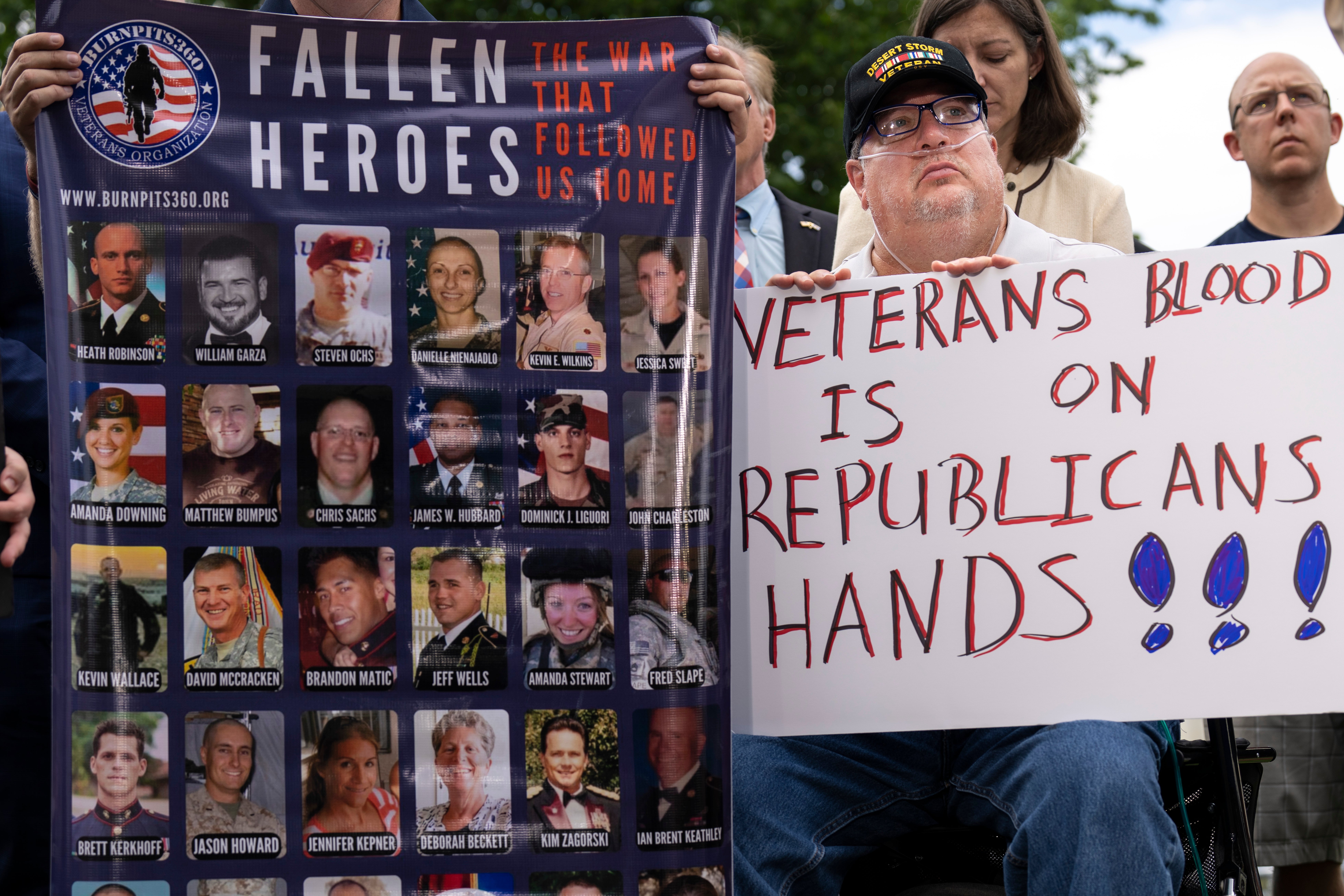
“That was a pivotal point as Beau Biden passed away from brain cancer and so [Mr Biden] felt our pain and could relate to us as a family,” Danielle said.
“When I was sitting at the SOTU address I did not believe this would be happening just a few months later,” she said of the bill signing.
“I felt it would still be a really long fight for years to come. I’m speechless to see this happen so quickly after so many years of not happening. I did not expect back in March to be here now.”
An ongoing battle
But the war on burn pits continued to rage on until the very bitter end.
On 27 July, Republican lawmakers – stoked up by outgoing Senator Pat Toomey who claimed there was an issue with the spending – launched a new and unexpected battle.
One month earlier, the Senate had voted overwhelmingly in favour of the passage of the PACT Act, with 84 senators voting yes and 14 Republicans voting no.
The vote seemed to signal that the fight was finally over and veterans, Democratic lawmakers and advocates celebrated the news on the steps of the US Capitol.
The bill had already sailed through the House and – after the Senate made some changes – it returned there where it once again passed without incident.
Returning to the Senate one final time with a minor technical change, veterans gathered to watch what they believed would be a historic moment.
Instead, 25 Republican lawmakers who voted in favour of providing healthcare and disability benefits to veterans switched their votes and the bill fell five short of the 60 needed to pass.
But the veteran community wasn’t going down without a fight.
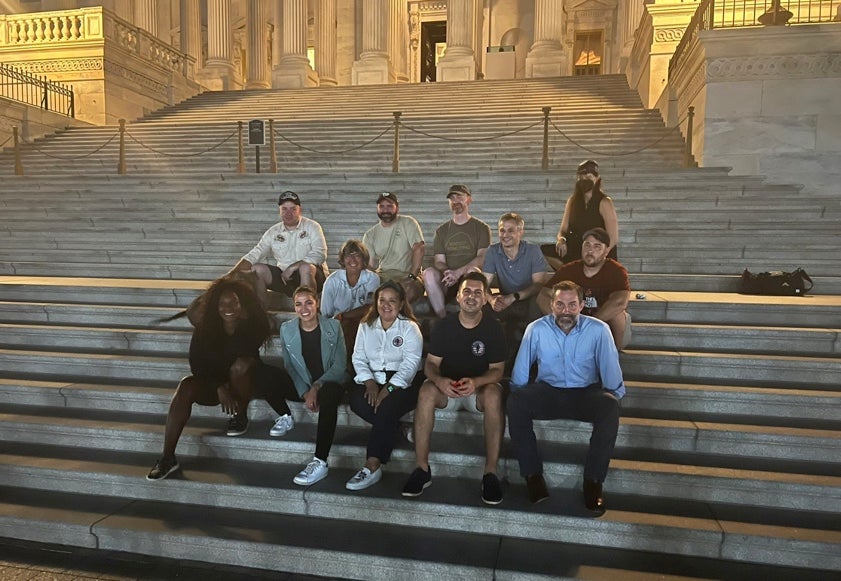
Veterans, family members and advocates staged a sit-in on the steps of the US Capitol, camping out for five nights in thunderstorms and heat waves in protest at the GOP actions.
“If the veterans during war don’t get to go home on recess or go on vacation then neither should those 25 senators,” Rosie told The Independent from the Capitol on 29 July.
“We are not going anywhere until it’s done.”
Mr Stewart also went on a media blitz where he railed against the GOP lawmakers responsible for the bill’s failure. He especially locked horns with Mr Toomey who he slammed a “f***ing coward” for his 11th hour attempt to derail the bill.
Senate Majority Leader Chuck Schumer gave Mr Toomey the chance to bring a vote on his amendment to the spending.
As expected, it failed.
The bill then passed the Senate with a vote of 86-11 – with support from two more than even the previous vote. Mr Toomey was among the 11 voting against the PACT Act.
Mr Feal told The Independent on Tuesday that he never doubted the PACT Act would become law when he joined in the fight back in 2018.
“Three-and-a-half years ago they asked me to get involved,” he said.
“And I said ‘I promise to get the bill passed’. When the bill got shot down I said ‘we’ve got to scorch the earth if you want to get it done’… that’s what got the bill done.”
But the fight is still far from over, said Mr Feal.
The hard part
“There was a sigh of relief last week when it passed,” he said.
“[The signing] should be a day of reflection for what it took to get here.
“When we walk away from the White House we have to watch the bill mature… now the hard work starts to make sure every page of the bill is followed, and that the VA accepts the claims and that everything gets in.”
He added: “The hard part is now.”
The veteran community is ready for it.
After the bill’s signing, Rosie and her husband plan to enjoy time with their one-year-old grandson and their granddaughter who is expected next week.
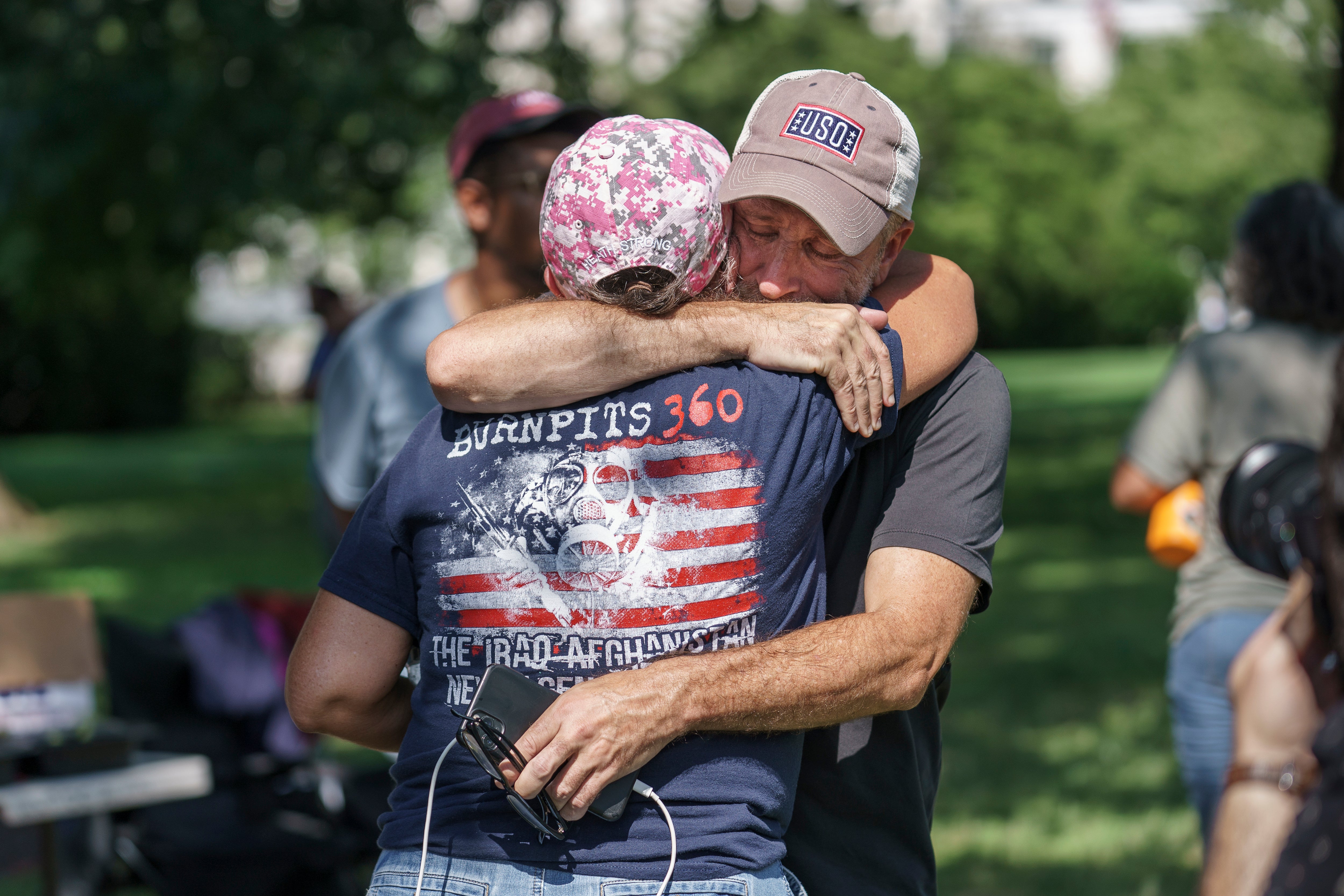
“And then we’ll continue on the mission, on the implementation and oversight of the PACT Act and making sure the prevention and screening part of this is eventually addressed,” she said.
“It’s super important for us… the veteran community has already come to me and said we need to make sure relationships stay strong and that other presumptives are also added later such as autoimmune issues.”
To go to the White House and see the bill they’ve pushed for for so many years be signed into law feels “very surreal”, she added.
“It feels like such a beautiful moment of victory but also a moment of sadness as we’ve lost so many people along the way,” she said.
“But it’s also a call to action to members of Congress that as a veteran community and military family community, we will stand at a fire watch any time there is an injustice like the one that happened.”
The Torres also have their sights set on helping other veterans pass the Major Richard Star Act.
The bill would allow veterans to receive full disability and retirement pay, regardless of how many years they served.
Mr Feal has also hinted that his work is far from over.
“I helped the 9/11 community and now I’ve helped the veterans community and now I’m going to do something bigger. Now, I’m going to do something to help the American people,” he said.
For Heath’s family, the president putting pen to paper finally marks the beginning of their grieving process.

“There’s been a lot of emotions over the years and many times I’ve wanted to give up and throw in the towel but every time I’ve seen another family impacted and going through everything we went through, it helps you to keep fighting,” Danielle said.
“But I haven’t really taken time to grieve and to accept the fact that he is gone and be able to go through the grieving process naturally. So I’m going to take time to work on mental health for myself and my daughter and take care of us going forward.”
She added: “I feel like I have been holding my breath for the last five or six years and this is the little light at the end of the tunnel and a weight lifted off my shoulders.
“I can finally breath again.”
Heath’s mother-in-law has been wearing his military jacket to Capitol Hill since 2017.
“Heath felt it was symbolic, that he was there with me and I was carrying him on my shoulders as he was too sick to come to DC with us,” said Ms Zeier.
“Now, I’ve officially retired it. And we can get back to our lives, to life before Heath’s cancer.”
She added: “Heath can now rest in peace. When we get back from the White House, we’re planning to go to his grave and we will tell him: ‘mission accomplished’.”




Join our commenting forum
Join thought-provoking conversations, follow other Independent readers and see their replies
Comments